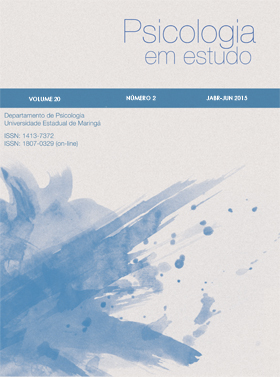DESENVOLVIMENTO DA AUTORREGULAÇÃO DA APRENDIZAGEM EM ESTUDANTES UNIVERSITÁRIOS: UM ESTUDO QUALITATIVO
Resumo
Estudantes autorregulados tendem a gerenciar suas demandas acadêmicas de modo flexível e crítico a fim de alcançar suas metas. Sendo assim, o objetivo dessa pesquisa foi compreender o processo de desenvolvimento da autorregulação da aprendizagem em estudantes universitários. Foi realizado um estudo de caso coletivo, sendo entrevistados três estudantes de graduação em três momentos distintos durante suas participações em uma intervenção com foco na promoção de competências autorregulatórias. Os dados foram analisados por meio de análise de conteúdo, seguindo categorias teóricas a partir do ciclo autorregulatório: fase de antecipação, de desempenho e de autorreflexão. Foi possível observar trajetórias particulares de desenvolvimento, caracterizadas pelo papel da autoeficácia como motivadora para proposição de objetivos e de estratégias. Além disso, conforme esperado teoricamente, o desenvolvimento autorregulatório pareceu depender inicialmente de reguladores externos para sua consolidação. Discute-se a importância de se promover feedbacks acadêmicos relacionados não apenas aos resultados das avaliações, mas também ao processo de estudos, para colaborar na construção de um estudante mais autônomo, crítico e autorregulado.
Downloads
Referências
Beiter, R., Nash, R., McCrady, M., Rhoades, D., Linscomb, M., Clarahan, M., & Sammut, S. (2015). The prevalence and correlates of depression, anxiety, and stress in a sample of college students. Journal of Affective Disorders, 173, 90-96. doi.org/10.1016/j.jad.2014.10.054
Berkout, J. J., Helmich, E., Teunissen, P. W., van der Vleuten, C. P. M., & Jaarsma, A. D. C. (2017). How clinical medical students perceive others to influence their self-regulated learning. Medical Education, 51, 269-279. doi: 10.1111/medu.13131
Braun, V., & Clarke, V. (2006). Using thematic analysis in psychology. Qualitative Research in Psychology, 3, 77-101. doi: 10.1191/1478088706qp063oa
Brown, S. D., Tramayne, S., Hoxha, D., Telander, K., Fan, X., & Lent, R. W. (2008). Social cognitive predictors of college students’ academic performance and persistence: a meta-analytic path analysis. Journal of Vocational Behavior, 72, 298-308. doi:10.1016/j.jvb.2007.09.003
Cleary, T., Callan, G.L., Malatesta, J., & Adams, T. (2015). Examining the level of convergence among self-regulated learning microanalytic processes, achievement, and a self-report questionnaire. Journal of Psychoeducational Assessment, 33(5), 439-450. doi: 10.1177/0734282915594739
Cleary, T., Callan, G. L., & Zimmerman, B. J. (2012). Assessing self-regulation as a cyclical, context-specific phenomenon: overview and analysis of SRL microanalytic protocols. Education Research International, 1-19. doi:10.1155/2012/428639
Cleary, T. J, & Zimmerman, B. J. (2001). Self-regulation differences during athletic practice by experts, nonexperts, and novices. Journal of Applied Sport Psychology, 13, 61-82. doi: 10.1080/104132001753149883
Fagundes, C. V. (2014). Percepção de estudantes universitários acerca do acesso à educação superior: um estudo exploratório. Revista Brasileira de Estudos Pedagógicos, 95(241), 508-525. doi.org/10.1590/S2176-6681/310212495
Haddad, S., & Taleb, R. A. (2016). The impact of self-efficacy on performance (an empirical study on business faculty members on Jordanian universities). Computers in Human Behavior, 55, 877-887. doi.org/10.1016/j.chb.2015.10.032
DiBenedetto, M. K., & Zimmerman, B. J. (2013). Construct and predictive validity of microanalytic measures of students’ self-regulation of science learning. Learning and Individual Differences, 26, 30-41. doi:10.1016/j.lindif.2013.04.004
Kim, K. R., & Seo, E. H. (2015). The relationship between procrastination and academic performance: a meta-analysis. Personality and Individual Differences, 82, 26-33. doi:10.1016/j.paid.2015.02.038
Lau, C., Kitsantas, A., & Miller, A. (2015). Using microanalysis to examine how elementary students self-regulate in math: a case study. Procedia – Social and Behavioral Sciences, 174, 2226-2233. doi: 10.1016/j.sbspro.2015.01.879
Sahranavard, S., Miri, M. R., & Salehiniya, H. (2018). The relationship between self-regulation and educational performance in students. Journal of Education and Health Promotion, 7, 1-5. doi: 10.4103/jehp.jehp_93_18
Stake, R. E. (1994). Case Studies. In N. Denzin Y. Lincoln, Handbook of qualitative research (pp. 236-247). Newsbury Park: Sage.
Weinstein, C., Husman, J., & Dierking (2000). Self-regulation interventions with a focus on learning strategies. In M. Boekaerts, P.R. Pintrich, & M. Zeidner (Eds.), Handbook of self–regulation: Theory, research, and applications (pp. 727-747). San Diego: Academic Press.
Wolters, C. A. (2003). Understanding procrastination from a self-regulated learning perspective. Journal of Educational Psychology, 95(1), 179-187. doi: 0.1037/0022-0663.95.1.179
Zimmerman, B. J. (2000). Attaining Self-Regulation: A Social Cognitive Perspective. Em M. Boekaerts, P. R. Pintrich, & M. Zeidner (Orgs.), Handbook of Self-Regulation (pp. 13- 35). San Diego: Academic Press.
Copyright (c) 2020 Psicologia em Estudo

This work is licensed under a Creative Commons Attribution-NonCommercial 4.0 International License.
As opiniões emitidas, são de exclusiva responsabilidade do(s) autor(es). Ao submeterem o manuscrito ao Conselho Editorial de Psicologia em Estudo, o(s) autor(es) assume(m) a responsabilidade de não ter previamente publicado ou submetido o mesmo manuscrito por outro periódico. Em caso de autoria múltipla, o manuscrito deve vir acompanhado de autorização assinada por todos os autores. Artigos aceitos para publicação passam a ser propriedade da revista, podendo ser remixados e reaproveitados conforme prevê a licença Creative Commons CC-BY.
The opinions expressed are the sole responsibility of the author (s). When submitting the manuscript to the Editorial Board of Study Psychology, the author (s) assumes responsibility for not having previously published or submitted the same manuscript by another journal. In case of multiple authorship, the manuscript must be accompanied by an authorization signed by all authors. Articles accepted for publication become the property of the journal, and can be remixed and reused as provided for in theby a license Creative Commons CC-BY.
















